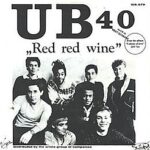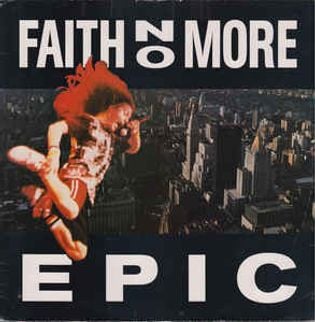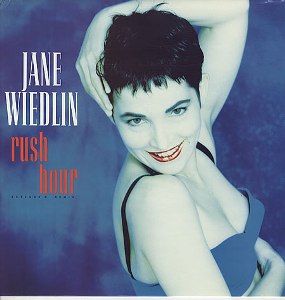 UB40’s “Red Red Wine,” released in 1983, stands as one of the most iconic reggae-infused pop songs to cross over into mainstream music. Originally written and recorded by Neil Diamond in 1967, UB40’s cover transformed the track into a smooth, laid-back reggae anthem, illustrating the band’s skill at merging genres and creating music that resonates across audiences. From the opening of the familiar, almost hypnotic guitar riff to Ali Campbell’s warm, expressive vocals, “Red Red Wine” exudes a sense of nostalgia, heartache, and escapism that immediately draws listeners in. The song’s enduring popularity is a testament to UB40’s ability to take a pre-existing work and reshape it with their signature sound, bridging pop, reggae, and soul in a way that feels both accessible and deeply emotive.
UB40’s “Red Red Wine,” released in 1983, stands as one of the most iconic reggae-infused pop songs to cross over into mainstream music. Originally written and recorded by Neil Diamond in 1967, UB40’s cover transformed the track into a smooth, laid-back reggae anthem, illustrating the band’s skill at merging genres and creating music that resonates across audiences. From the opening of the familiar, almost hypnotic guitar riff to Ali Campbell’s warm, expressive vocals, “Red Red Wine” exudes a sense of nostalgia, heartache, and escapism that immediately draws listeners in. The song’s enduring popularity is a testament to UB40’s ability to take a pre-existing work and reshape it with their signature sound, bridging pop, reggae, and soul in a way that feels both accessible and deeply emotive.
The magic of “Red Red Wine” lies in its emotional relatability. Its lyrics speak to the experience of seeking comfort and solace in drink while grappling with the lingering memories of lost love. UB40’s version amplifies the melancholy while softening the edges through its soothing rhythms and melodic arrangements. The track became a global hit, topping charts and becoming a staple of both reggae playlists and mainstream radio. Its appeal transcends generations, offering a song that can be danced to, swayed with, or quietly reflected upon. Beyond its commercial success, the track highlights UB40’s broader contribution to popularizing reggae music outside of Jamaica, proving that thoughtful, heartfelt reinterpretations can leave a lasting impact on global music culture.
The Musical Transformation
UB40’s rendition of “Red Red Wine” exemplifies how the band turned a classic pop ballad into a reggae masterpiece. The group slowed the tempo, introduced a syncopated guitar rhythm, and layered a smooth bassline that became the track’s heartbeat. The drums and percussion were understated yet essential, providing a groove that supports the song’s reflective mood without overpowering the vocals. Ali Campbell’s singing, warm and understated, carries the story of love and loss with restraint and emotional clarity, allowing listeners to internalize the lyrics and connect to the song’s narrative.
The band’s arrangement choices were crucial in making the song universally appealing. By maintaining the lyrical essence of Neil Diamond’s original while changing the musical context, UB40 created a track that felt both familiar and innovative. The reggae rhythm added a sense of movement and sway, turning the song into something that could be enjoyed on both dance floors and in quiet moments of contemplation. This transformation demonstrates the band’s knack for blending genres and making songs resonate with new audiences.
Lyrics That Balance Heartache and Solace
At its core, “Red Red Wine” is a song about seeking escape from the pain of lost love. The lyrics are simple yet deeply evocative: “Red, red wine / Go to my head / Make me forget that I / Still need her so.” These lines capture the universal feeling of longing, heartache, and temporary reprieve through indulgence. UB40’s version intensifies the emotional resonance by placing the words within a rhythmic, swaying context, emphasizing the bittersweet nature of consolation and reflection.
What makes the song enduring is its emotional honesty. It doesn’t shy away from vulnerability. The listener is invited into the singer’s introspection, feeling both the sadness of separation and the small comfort of ritual or habit—here symbolized by wine. The simplicity of the lyrics allows them to be widely relatable, connecting with listeners’ own experiences of heartbreak, regret, and the search for solace.
UB40’s interpretation adds layers of cultural resonance as well. By giving a reggae spin to a pop ballad, the band placed the song within a musical tradition often associated with relaxation, resilience, and communal storytelling. This genre shift allows the listener to experience the song in a fresh emotional landscape while retaining the core sentiment of Diamond’s original.
Production and Instrumentation
The production of UB40’s “Red Red Wine” captures both the essence of reggae and the polish required for mainstream success. The track’s clean, minimal production emphasizes the rhythm section, highlighting the bass and drum groove that gives reggae its characteristic sway. The guitar provides gentle counterpoints, often using muted, syncopated strumming that adds texture without drawing attention away from Campbell’s vocals. Keyboards subtly fill out the arrangement, lending a warm, atmospheric quality that enhances the song’s reflective tone.
This production balance allows the song to feel intimate and universal at the same time. Unlike heavily produced pop tracks of the era, UB40’s version preserves a sense of organic performance, as if the listener is sitting in a small venue or by the beach, sharing in the story. The restrained instrumentation underscores the lyrics rather than competing with them, ensuring that the emotional core of the song remains at the forefront.
Cultural Impact and Global Reach
“Red Red Wine” became more than a hit single—it was a bridge between cultures and musical traditions. UB40, a British band with a diverse lineup, helped bring reggae to an international audience, showcasing the genre’s versatility and emotional depth. Their success with the song helped pave the way for other reggae and reggae-inspired acts to find mainstream recognition, demonstrating that the genre could resonate globally without losing its distinctive feel.
The song also enjoyed renewed success decades later, demonstrating its enduring appeal. Its themes of heartache, escape, and solace are timeless, while its relaxed groove makes it perpetually accessible. “Red Red Wine” has been covered, sampled, and referenced by countless artists, proving its influence across genres and generations. From beach bars to karaoke nights to stadium concerts, it continues to inspire communal enjoyment and individual reflection alike.
Beyond music, the track has permeated popular culture in subtle ways. Its association with leisure, relaxation, and emotional release has made it a fixture in films, television shows, and commercials. Its catchy melody and memorable lyrics ensure that even casual listeners recognize the song, demonstrating the power of a well-crafted cover to outlive its original incarnation in the cultural imagination.
Legacy and Enduring Popularity
Decades after its release, UB40’s “Red Red Wine” remains a definitive example of how reinterpretation can elevate a song to iconic status. Its blend of reggae instrumentation, emotive vocals, and accessible production has solidified its place in both pop and reggae history. The track showcases UB40’s skill in crafting music that feels both familiar and innovative, proving that successful covers are not just about replication but about transformation.
The song’s legacy is also tied to its emotional universality. Whether listeners are experiencing heartbreak, nostalgia, or simply seeking a moment of relaxation, “Red Red Wine” offers a space for reflection and enjoyment. Its ability to evoke mood, inspire movement, and connect with a wide audience ensures that it will remain a beloved track for generations to come.
UB40’s interpretation highlights how music can transcend its original context. By reimagining a pop ballad as a reggae anthem, the band demonstrated the power of cross-genre creativity. This approach influenced future musicians, encouraging them to experiment with style and interpretation, and ultimately contributing to the broader evolution of global music trends.
Conclusion: A Reggae Pop Classic
UB40’s “Red Red Wine,” released in 1983, exemplifies the magic of musical reinterpretation. With its reggae-infused rhythm, smooth vocals, and emotionally resonant lyrics, the song transformed Neil Diamond’s original into a track that resonates across decades and continents. Its appeal lies in its ability to balance heartache and solace, melancholy and groove, creating a listening experience that is both reflective and enjoyable.
The song’s enduring popularity reflects UB40’s artistry, cultural insight, and understanding of music’s emotional impact. By bridging genres and presenting a universal story of love and loss in a fresh musical context, “Red Red Wine” became more than a cover—it became a cultural touchstone. Its influence continues to be felt, inspiring covers, remixes, and countless listeners to sway along to its timeless rhythm.
Ultimately, “Red Red Wine” endures because it captures the universal human experience of longing and escape while offering a musical setting that is both relaxing and captivating. UB40’s interpretation demonstrates the power of creativity, emotional honesty, and cultural sensitivity in creating music that stands the test of time. It remains a track that listeners return to, swaying along to the rhythm, lost in the story, and reminded of the enduring magic of a perfect song.


